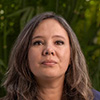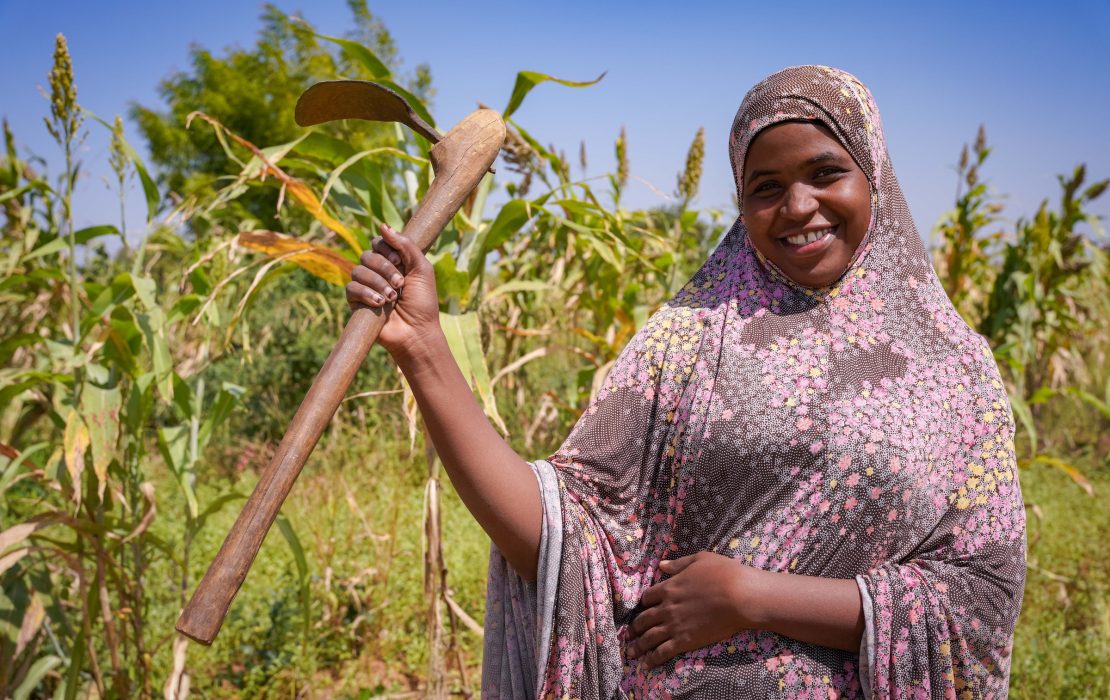Rokiatou Traoré at COP28 in Dubai. Photo: Ishimwe Cedric
Rokiatou Traoré is a young woman from Mali, passionate about projects with positive economic, social and environmental impacts. After studying and working abroad for several years, she decided to return to Mali and establish HEROU Alliance, a social venture dedicated to developing inclusive value chains around agroforestry products.
While working with communities on the ground, Rokiatou witnessed first-hand the challenges they faced from climate change impacts. She soon realized that their voices, especially those of women, were not being heard in the rooms where decisions about climate action were made. Emboldened by this knowledge, she decided to seek out new knowledge and skills that would allow her to get involved in climate change negotiations, at the local and international levels, and push for the integration of gender dimensions in climate action.
I spoke with her about her motivations, her accomplishments, and her wishes for accelerated, inclusive climate action.
Why did you start working on climate change issues?
Each year, six million tonnes of wood are consumed in Mali, leading to deforestation and the rapid progression of desertification. Our idea, when we founded HEROU Alliance, was to work with rural communities confronted with the impacts of deforestation and climate change, such as desertification and malnutrition.
In our pilot phase, we trained 60 women to cultivate moringa, a fast-growing, drought-resistant tree with significant nutritional benefits. Since then, we have scaled up to collaborating with around 10,000 women and young farmers in western Mali for the processing and marketing of moringa-derived products, which we sell on local, national and international markets.
What impacts of climate change have you observed in your country over the past years?
Recurring droughts and floods have become a major issue across Mali, especially for rural communities that rely on agriculture for their livelihoods. They have also deeply affected our tree planting activities. In 2022, we planted 20,000 moringa tree seedlings but, unfortunately, half of them were lost due to floods.
Then in 2023, we had an invasion of armyworms and because of the lack of rains, the pest could multiply and infest our seedlings and crops. Many farmers were left with nothing to harvest. We also lost half of a nursery of 150,000 seedlings we had just installed in the zone of Baguineda.
In such situations, it's evident that women remain more vulnerable than men. Since they have reduced access to land and farm on smaller plots this leaves them with limited options during times of crisis. They're also not the ones taking decisions, making them unable to contribute to solutions. To address this, we must work towards providing women with equal access to land and resources, empowering them to participate in decision-making processes within their communities.
Rokiatou works with rural communities confronted with the impacts of deforestation. Photo: Sekou Diakité
HEROU Alliance has supported around 10,000 women and young farmers in western Mali. Photo: Kassim Diakité
What sparked your interest in climate change negotiations? And why is it important to have more young African women involved in these processes?
As a young woman from Mali who has had the opportunity to study and work abroad, I believe my impact should extend beyond just the work I do on the ground. I feel it’s time for me to step into decision-making processes.
I feel I can help ensure that those most affected by climate change in Mali and many other African countries—particularly women in rural areas—are represented in these discussions. Through my work I witness the challenges they face every day and I work on how to address them. One of my goals is therefore to help make these challenges be known and help amplify the voices of women farmers and youth in the negotiation rooms, where they often lack representation and the opportunity to influence decision-making processes.
This is particularly important because when participants in climate change negotiations better understand climate impacts and their implications on the ground, reaching agreements and making swift decisions to address these issues becomes more achievable.
What experiences did you gain in climate change negotiations?
I am grateful for the opportunity to have taken part in a training on UNFCCC negotiations organized by the African Group of Negotiators on Climate Change (AGN), with support from UNDP, which convened junior and new women leaders for negotiations from more than fifty African countries in Zambia.
The training served as an invaluable introduction to the complexities of climate change negotiation processes. It also helped me improve my understanding of the intersection between agriculture and climate change negotiations, and the significant gender dimensions within it. Given my background and the fact that I follow the negotiation stream on agriculture, for which I am mentored by a senior negotiator who also follows agriculture, this alignment was particularly meaningful to me.
Moreover, I was able to learn more about initiatives like the Sharm el-Sheikh joint work on the implementation of climate action on agriculture and food security, which acknowledges the vulnerability of food production systems to climate change and underscores the pivotal role of farmers, especially smallholders and pastoralists, as agents of change. I also learned about the Africa Adaptation Initiative initiated by Amb Seyni Nafo from Mali.
Rokiatou at the Bonn Climate Change Conference. Photo: Lamine Sidibé
Rokiatou with Mr. Ephraim Mwepya Shitima, Chair of the African Group of Negotiators on Climate Change. Photo: Friday Phiri
This was particularly useful when I attended the Bonn Climate Change Conference and sessions related to the start of the implementation of this initiative at COP28 in Dubai. Thanks to the training and the continued support of other African negotiators, which is essential given the complexity of climate negotiations, I feel I was better prepared for these discussions.
I also had the opportunity to join the consultations, working groups, and information exchange sessions of the AGN, the Least Developed Countries Group on Climate Change, and the Group of G77 and China.
What are your plans for the future?
One of my objectives is to continue learning about UNFCCC negotiation processes, with the final goal of being able to fully contribute to facilitating consensus and supporting the implementation of the decisions made at COP.
In the coming months, within the G77 and China group, I’ll join other fellow young leaders to discuss and refine our positions and develop strategies to contribute to negotiations this year.
At the same time, I will continue my activities as an entrepreneur. We aim to plant 150,000 trees during the rainy season starting in May. We've changed our strategies to reduce the risk of pests this year, and we will start working with farmers to reach this objective soon. My greater ambition is to train 150,000 women and young farmers and support them in planting 10 million trees by 2030.
What are your hopes to advance the role of African women in climate action?
I am eager to see more initiatives focused on combating deforestation and desertification, and one way to do so is to promote the development of plant-based products in developing countries. This will be key to help fight hunger and women should have a specific place in it. According to a study by FAO, providing equal opportunities to women in agriculture could potentially lift up to 150 million people out of hunger.
We need to allocate more investment to women farmers and entrepreneurs, providing them with the resources they need to succeed. Additionally, we should create more opportunities for women to implement their knowledge and skills. It's vital to ensure women are included and can make their voices heard in decision-making processes and negotiation forums. They need to be able to contribute to shaping policies and actions that affect them directly.
And we need to invest in building capacities. When you look at the top positions, women are still underrepresented, since men often have a better access to training and knowledge, positioning them for higher roles. However, if women are given equal opportunities, they can excel in these positions.
***
The capacity-building workshop for youth and new women negotiators, designed to strengthen Africa’s capacities towards implementation of the UNFCCC and the Paris Agreement, was organized by the African Group of Negotiators on Climate Change in March 2023 in Livingstone, Zambia.
This was made possible thanks to funding from the European Union, through the Progressive Platforms for Climate Action Project, and with technical assistance from UNDP. Capacity building initiatives and related support from donors are key to fostering climate action both locally and internationally. UNDP aims to continue supporting these efforts based on their effectiveness and relevance.


